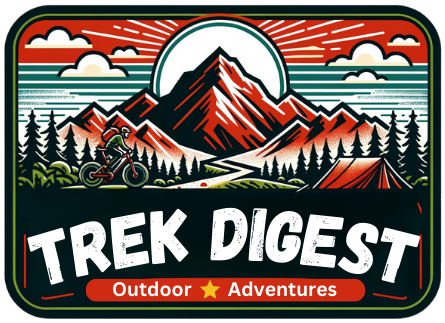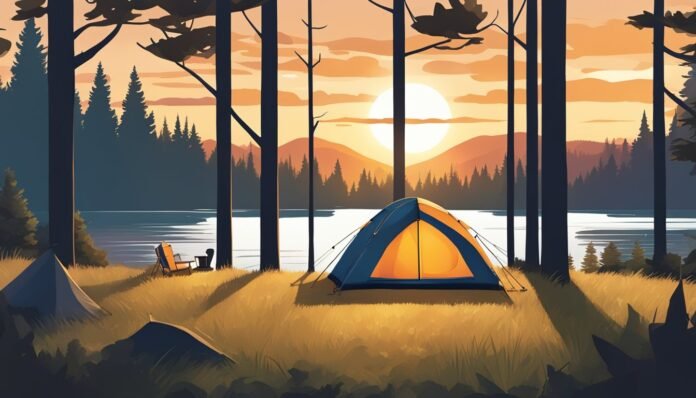Are you looking for a way to disconnect from the hustle and bustle of everyday life? Do you want to spend time in nature, but don’t have anyone to go with? Solo camping might be the perfect solution for you.
In recent years, solo camping has become a growing trend among outdoor enthusiasts. According to a report by The Dyrt, in 2023, almost 30% of campers camped alone at least one night. This trend is not limited to experienced campers; even first-time campers are choosing to go solo.
But why is solo camping becoming more popular? There are several reasons. For some, it’s a chance to disconnect from technology and the stresses of daily life. For others, it’s an opportunity to challenge themselves and build self-reliance. And for many, it’s simply a way to enjoy the peace and solitude of nature. Whatever your reason, solo camping can be a rewarding and fulfilling experience.
The Rise of Solo Camping
Solo camping has become a growing trend in recent years. More and more people are venturing out into the wilderness alone, seeking solitude and adventure. In this section, we will explore the reasons behind the rise of solo camping.
Cultural Shift Towards Individualism
One reason for the rise of solo camping is the cultural shift towards individualism. In today’s society, people are increasingly valuing independence and self-reliance. Solo camping provides an opportunity for individuals to challenge themselves and test their limits in a self-sufficient environment. It allows them to disconnect from the distractions of modern life and reconnect with nature on their own terms.
Technological Advancements in Gear
Another reason for the rise of solo camping is the technological advancements in camping gear. Lightweight and durable equipment such as tents, sleeping bags, and backpacks have made it easier for individuals to carry everything they need for a solo camping trip. Portable stoves, water filters, and solar chargers have also made it possible for individuals to stay self-sufficient for longer periods of time.
Social Media Influence
Social media has also played a role in the rise of solo camping. Platforms such as Instagram and YouTube have created a community of solo campers who share their experiences and inspire others to venture out on their own. The ability to document and share their adventures has made solo camping more accessible and appealing to a wider audience.
In conclusion, the rise of solo camping can be attributed to a cultural shift towards individualism, technological advancements in camping gear, and social media influence. Solo camping provides an opportunity for individuals to challenge themselves, reconnect with nature, and experience the wilderness on their own terms.
Benefits of Solo Camping
Solo camping is an adventure that offers a multitude of benefits for those seeking self-discovery, connection with nature, and personal growth. Through the exploration of solitude, self-reliance, and the wonders of the wilderness, solo camping allows you to break free from the constraints of everyday life and immerse yourself in the natural world.
Mental Health and Mindfulness
One of the most significant benefits of solo camping is the positive impact it can have on your mental health. Spending time in nature can reduce stress, anxiety, and depression, and promote feelings of calm and relaxation. Solo camping also provides an opportunity to practice mindfulness, which can help you stay present in the moment and appreciate the beauty of your surroundings.
Skill Development and Self-Reliance
Solo camping requires you to rely on yourself for everything, from setting up camp to cooking your meals and navigating the wilderness. This can help you develop important skills such as problem-solving, decision-making, and self-reliance. Learning to be self-sufficient can also boost your confidence and self-esteem, and give you a sense of accomplishment and pride.
Deepened Connection with Nature
Solo camping allows you to fully immerse yourself in the natural world and connect with the environment in a way that is not possible in everyday life. Without the distractions of technology and other people, you can tune in to the sights, sounds, and sensations of the wilderness and develop a deeper appreciation for the natural world.
In summary, solo camping is a growing trend for a reason. It offers a unique opportunity to disconnect from the stresses of everyday life, connect with nature, and develop important skills and qualities. Whether you are a seasoned camper or a beginner, solo camping can be a rewarding and life-changing experience.
Frequently Asked Questions
What are the benefits of solo camping?
Solo camping provides a unique opportunity to connect with nature and yourself. It allows you to escape the distractions of modern life and experience true solitude. Solo camping can help reduce stress and anxiety, promote self-reflection, and improve mental health.
What safety precautions should one take when camping alone?
When camping alone, it’s important to prioritize safety. Always let someone know where you’re going and when you plan to return. Bring a first aid kit, plenty of water, and a means of communication in case of an emergency. It’s also important to research the area you’ll be camping in and be aware of any potential hazards, such as wildlife or inclement weather.
How has the perception of camping alone changed over time?
Camping alone was once seen as a risky and potentially dangerous activity. However, as more people have started to prioritize mental health and outdoor experiences, solo camping has become a more accepted and even celebrated activity. With advances in technology and communication, solo camping has become safer and easier than ever before.
What essential gear is recommended for a solo camping trip?
When camping alone, it’s important to have the right gear to ensure your safety and comfort. Essential gear includes a tent, sleeping bag, camp stove, headlamp, and a means of communication. It’s also important to bring appropriate clothing and footwear for the weather and terrain.
How does solo camping impact mental health?
Solo camping can have a positive impact on mental health by providing an opportunity for solitude and self-reflection. Being in nature has been shown to reduce stress and anxiety and improve mood. Solo camping can also help build confidence and self-reliance.
What skills should one develop before embarking on a solo camping adventure?
Before embarking on a solo camping adventure, it’s important to have basic camping skills, such as setting up a tent, starting a campfire, and navigating with a map and compass. It’s also important to have a basic understanding of first aid and wilderness survival skills. Taking a camping course or going on a guided camping trip can help develop these skills.

